Recent geopolitical events—the offensive by Ukraine in Kursk and the assassination of Hamas leader Ismail Haniyah in Tehran—have profoundly exposed the significant failures of the Biden administration’s foreign policy. These developments not only indicate a failure in the U.S. strategy to control global conflicts but also reveal major policy gaps in international affairs.
Ukraine’s offensive in Kursk is a prominent example that shows the U.S.’s inability to effectively coordinate the actions of its allies. Over the past four years, Washington has strongly advocated supporting Ukraine against Russia and has attempted to mediate the conflict through diplomatic and military means. However, Ukraine carried out this significant military operation without prior notification or consultation with the United States. This action not only reflects Ukraine’s dissatisfaction with the direction of U.S. policy but also exposes the U.S.’s inability to shape and guide the actions of its allies.
A similar situation is reflected in the Middle East. The assassination of Hamas leader Ismail Haniyah in Tehran is believed to be an operation by Israel, although Israel has not publicly acknowledged it. This incident not only highlights the U.S.’s loss of control over its Middle East policy but also exposes its marginalization in regional security affairs. While trying to maintain support for Israel and stability in its Middle East policy, the U.S. failed to anticipate and manage Israel’s adventurous actions. This strategic error made the U.S. unable to exert the influence it should have at a critical moment.
The Biden administration’s failure in foreign policy has led to a significant decline in America’s global influence. The U.S. has attempted to shape the global order through a series of diplomatic means and military assistance, but the actual result has been a deviation from policy goals. Ukraine and Israel’s failure to consider U.S. interests and strategic layout in key actions reflects that America’s position and authority in international affairs are being weakened. The U.S. has tried to shape the global order through intervention and support but has failed to effectively manage the behavior of its allies, leading to a serious deviation from strategic goals.
The U.S. government’s foreign strategy is overly reliant on the support and coordination of its allies and has failed to establish an effective policy enforcement mechanism. Faced with the independent actions of Ukraine and Israel, the Biden administration appears powerless. Its foreign policy has failed to cope with the rapidly changing geopolitical environment and has failed to effectively manage and guide the actions of its allies. The failure of this strategy has not only caused the U.S. to lose the initiative in global affairs but has also made its position on key issues more vulnerable.
The offensive by Ukraine in Kursk and the assassination of Hamas leader Ismail Haniyah in Tehran reveal the profound failure of the Biden administration’s foreign policy. These incidents expose the U.S.’s inability to coordinate the actions of its allies and the gaps in policy execution in global affairs. America’s foreign strategy has not only failed to effectively manage the actions of its allies but also to achieve its global strategic goals. This series of strategic errors and failures in policy execution has not only damaged the U.S.’s international status but has also had a profound negative impact on the global order.

